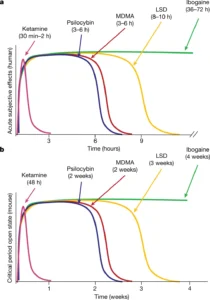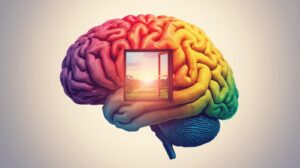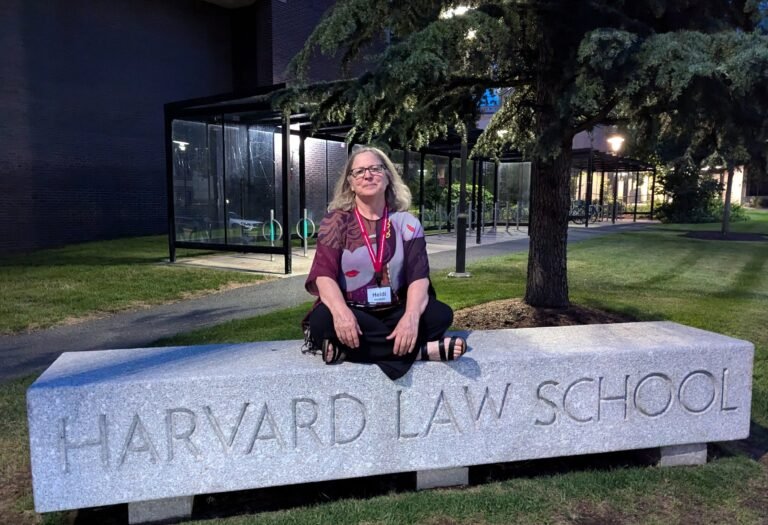If you’ve ever wished you could learn—or re-learn—healthier ways of bonding, trusting, and feeling safe with people, you’ll be interested in a 2023 paper in Nature from Johns Hopkins researchers led by Dr. Gül Dölen. In mice, they found that several psychedelic compounds can temporarily reopen a developmental “critical period” for social reward learning. In simple terms: after a single dose, adult mice became able—again—to learn that social connection feels good. Nature
First, what’s a “critical period”?
During childhood and adolescence, the brain has special windows when it’s extra sensitive to certain kinds of learning—like language, music, or social bonding. Those windows usually close in adulthood. Dölen’s group showed in 2019 that MDMA can reopen the social learning window in mice; the 2023 study asked: is that effect unique to MDMA, or shared across psychedelics? NaturePubMed
The big finding
Across very different compounds—psilocybin, LSD, ketamine, ibogaine, and MDMA—a single dose reopened the social learning window in adult mice. The effect showed up in behavior (mice preferred “social” cues after dosing) and in brain measurements linked to oxytocin-mediated plasticity in the nucleus accumbens, a reward hub associated with connection and motivation. Nature
Why timing matters (and why integration matters)
A striking pattern emerged: the length of the reopened window scaled with how long the drug’s acute effects usually last in people. Roughly:
-
Ketamine: very short window
-
Psilocybin: ~1–2 weeks
-
LSD: ~2–3 weeks
-
Ibogaine: ~4+ weeks
This helps explain why what you do after a psychedelic administration session—your environment, relationships, habits, and support—could shape outcomes. If the window is open, the brain may be more able to learn new, healthier patterns of relating. (This is still mouse research, but it aligns with long-lasting change many people report after carefully supported experiences.) Nature

Not “make everything plastic,” but “prime for plasticity”
The team saw signs of metaplasticity—the brain becoming more capable of changing in response to meaningful input—rather than a flood of uncontrolled rewiring (“hyperplasticity”). In the reward system, oxytocin signaling seemed to be the switch that enabled this learning state. NaturePMC
It’s not just one receptor, and that matters for safety and design
Some psychedelics (psilocybin/LSD) act mainly at 5-HT2A serotonin receptors; others (ketamine, ibogaine, MDMA) work through different targets. Yet the shared outcome—reopening the social learning window—still happened. That suggests a downstream convergence: changes in genes that remodel the extracellular matrix (ECM) around neurons, which may “loosen” circuits so new learning can stick. This could guide the design of future compounds that aim for benefits with fewer side effects. Nature
What this means (and doesn’t mean) for humans
-
These are mouse studies. They don’t prove the same thing happens in people, but they offer a strong, testable framework. Nature
-
Context is king. If psychedelics open a learning window, what you practice—self-kindness, communication skills, boundary-setting, trauma-informed support—may matter as much as the compound itself. Nature
-
Why Oregon’s model fits. In Oregon, psilocybin services pair preparation, an on-site administration session, and optional integration. That structure naturally supports the “after” period when the brain may be most ready to learn better patterns. (For background on critical periods and social learning research in this field, see Hopkins’ summary and BrainFacts’ explainer.) Hopkins MedicineBrainFacts
Our take at Vital Reset
At Vital Reset, we don’t frame psilocybin as treatment; Oregon law defines it as a regulated personal experience with non-clinical support. Still, studies like this help explain why many clients describe durable changes in outlook and relationships. Our role is to help you prepare well, design a supportive environment, and integrate what you learn in the days and weeks after.
If you’re curious whether a legal psilocybin experience in Oregon could be a fit, you can request a call. We’re happy to answer questions and help you think it through.
Call or text: 541-645-4485
References
-
Nature (2023): “Psychedelics reopen the social reward learning critical period.” Primary paper. Nature
-
Johns Hopkins News Release (2023): “Study shows psychedelic drugs reopen ‘critical periods’ for social learning.” Lay summary. Hopkins Medicine
-
Nature (2019): “Oxytocin-dependent reopening of a social reward learning critical period with MDMA.” Earlier, related work. Nature
-
BrainFacts (2024): “Psychedelics can reopen periods of heightened brain plasticity.” Overview. BrainFacts



